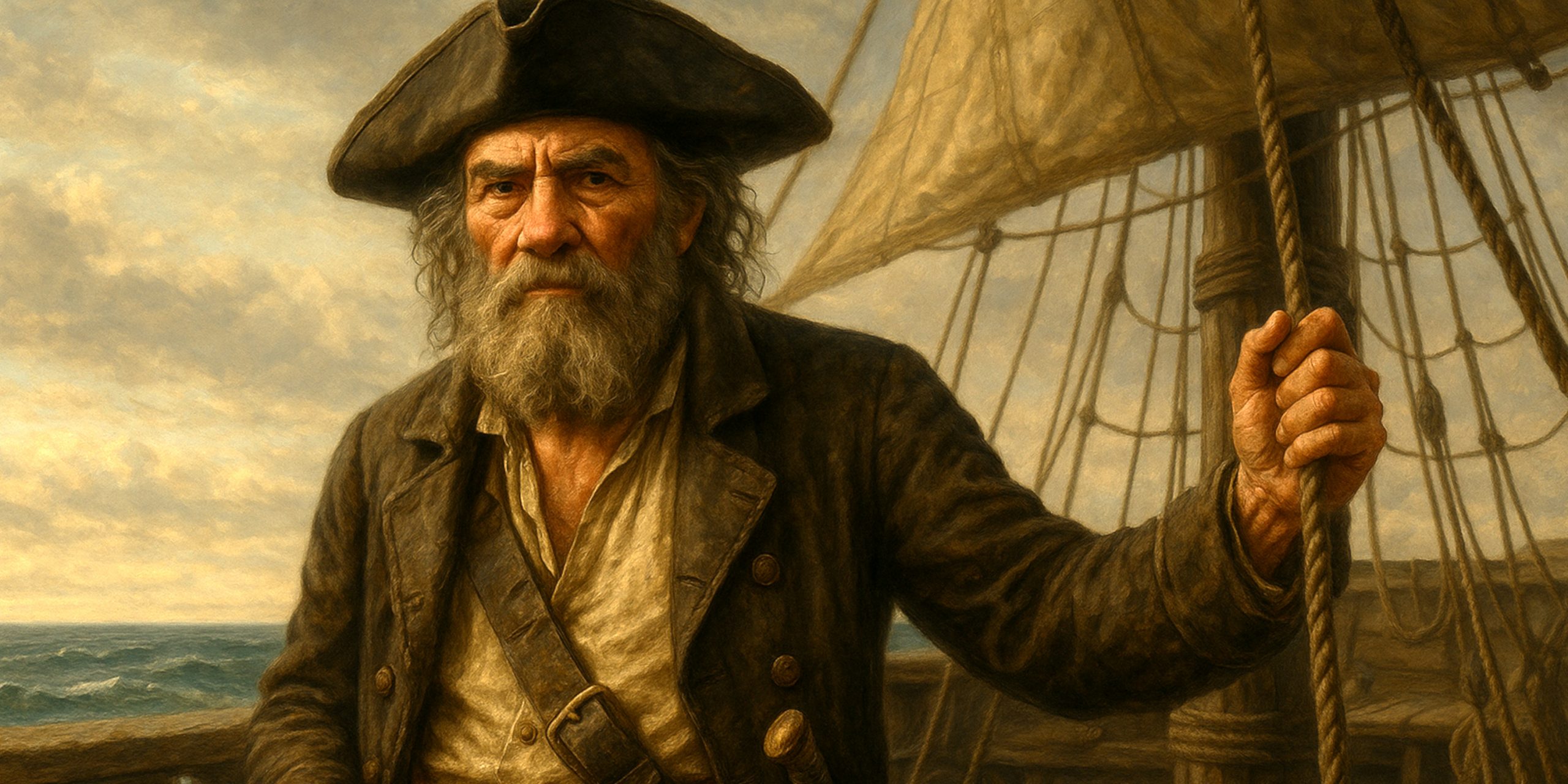
Pirates have long occupied a strange place in popular imagination, part brutal criminal, part folk hero. Their words, whether actual or apocryphal, have been immortalised in court records, memoirs, and tavern stories.
“A merry life and a short one shall be my motto.”
Attributed to: Bartholomew “Black Bart” Roberts
Context:
This quote appears in A General History of the Pyrates by Captain Charles Johnson (likely a pseudonym). Roberts was one of the most successful pirates of the Golden Age, capturing over 400 ships. The quote reflects his fatalistic approach to piracy, which he saw as preferable to the drudgery of lawful seafaring. It also underlines the high mortality rate among pirates and their embrace of risk over repression.
“Damnation seize my soul if I give you quarters, or take any from you.”
Attributed to: Edward “Blackbeard” Teach
Context:
This was allegedly shouted by Blackbeard during his final battle in 1718 off the coast of North Carolina. Governor Spotswood of Virginia had sent a naval force under Lieutenant Robert Maynard to hunt him down. The line is fitting, if not precisely verified, and speaks to the mythic quality Blackbeard cultivated around himself. His fearsome reputation was built as much on theatre as violence.
“I am a free prince and I have as much authority to make war on the whole world as he who has a hundred sail of ships at sea.”
Attributed to: Samuel “Black Sam” Bellamy
Context:
Bellamy, sometimes called the “Prince of Pirates,” reportedly spoke this in defence of piracy as a form of rebellion. This was during a captured shipboard speech, criticising the rich for hoarding power while seamen starved. It taps into the quasi-political nature of some pirate rhetoric, casting themselves as enemies of corruption rather than mere thieves.
“They vilify us, the scoundrels do, when there is only this difference: they rob the poor under the cover of law… and we plunder the rich under the cover of our own courage.”
Attributed to: Captain Charles Bellamy (often confused with Samuel Bellamy)
Context:
Whether this speech came from Samuel or Charles Bellamy is still debated, but the sentiment is often associated with the so-called “pirate code” of justice among equals. It offers a glimpse into how some pirates justified their actions morally, drawing comparisons with corrupt state actors.
“Take what you can, give nothing back.”
Fictionalised
Popularised by: Disney’s Pirates of the Caribbean
Context:
This line is often misattributed to real historical pirates. It gained traction through the film franchise, where it was used by Jack Sparrow and other characters. Although catchy, there is no known historical record of any pirate saying this. It reflects modern romanticisation of piracy rather than genuine source material.
“It is a short life and a merry one.”
Attributed to: Captain Kidd or variously misquoted from Roberts
Context:
This line overlaps with Roberts’ “merry life” quote, but has also been linked—incorrectly—with Captain William Kidd, whose story straddles the line between privateer and pirate. Kidd was eventually hanged for piracy despite claims he had acted under commission. The phrase reflects a recurring theme among pirates: to live vividly, even if briefly.
“There is none of you but will hang me, I know, whenever you can clinch me… and damn you, you cowards, I’ll make you walk the plank.”
Attributed to: Stede Bonnet
Context:
Stede Bonnet, the so-called “Gentleman Pirate,” was a landed aristocrat who turned to piracy. Although not known for tactical brilliance, Bonnet’s trial records and letters suggest a volatile temperament. This alleged quote is theatrical and probably apocryphal, but it highlights how the concept of “walking the plank” entered pirate mythology despite little historical evidence it was used.
“Dead men tell no tales.”
Possibly apocryphal, widespread in folklore
Context:
This phrase has no concrete attribution, but it appears frequently in fiction and pirate lore. It summarises a brutal truth about piracy: witnesses could not be left alive. It became a stock phrase in 20th-century popular culture and was used heavily in adventure novels and films. It likely reflects an amalgam of oral tradition and romanticised fear.
Pirate Language vs Pirate History
Many of the “pirate phrases” commonly repeated today owe more to 20th-century fiction than 18th-century decks. Phrases like “Arrr,” “Shiver me timbers,” and “Avast ye” were theatrical inventions, popularised by actors like Robert Newton in Treasure Island (1950). Newton’s exaggerated West Country accent became the stereotypical “pirate voice,” even though pirates hailed from across the world and spoke many languages.
Seven Swords Takeaway
While some quotes above are based on real speech or documented writing, others were fabricated or heavily embellished. Pirate captains were not folk philosophers by nature, but the legends that grew around them often gave their words a weight they never held in life. What remains is a blend of fear, bravado, and myth, preserved by sailors, authors, and the courtroom scribes who recorded their final defiance.
Watch quotes from Captain Jack Sparrow:










